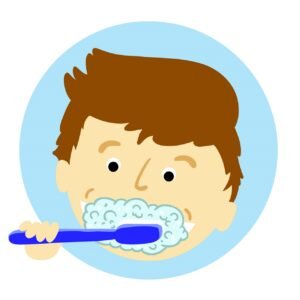12 Best Oral Health Tips For Infants and Toddlers

Tooth decay remains one of the most common diseases of childhood. Untreated tooth decay causes daily suffering due to: persistent pain, inability to eat comfortably or chew well, embarrassment at damaged teeth, and distraction from learning. Oral health is important for children as it affects their overall health and well-being. Here are 12 tips for parents to promote good oral health in their children:
1. Breast-feed your baby and don’t use bottles. In addition to infections, bottles also cause tooth decay, especially when used at bedtime. Milk, formula, juices, and other drinks contain sugar. Prolonged exposure to sugary drinks while a baby sleeps (when saliva flow is reduced) increases the risk of tooth decay.
2. Encourage your children to eat regular nutritious meals and to avoid frequent between meal snacking. Soda and other sweetened drinks, candy and sugar cane are especially harmful.
3. For children, use a small, soft toothbrush. Even for adults, soft brushes are best. (Sometimes brushes are too hard and may cause the gums to bleed. To soften the brush you may carefully insert the lower part of the bristles in very hot water. Do not insert the plastic part of the brush in the hot water as this may loosen the bristles.)
4. Interdental cleaners are now also often used. These are special wooden or plastic picks or brushes that are used to clean between teeth.
5. Homemade toothbrushes and Interdental cleaners are also effective. These can be made with a twig that is sharpened on one end to clean debris between the teeth and chewed on the other to make a brush.
6. If dental floss is not available, clean sewing thread or fishing line is sometimes used. Then “swish” between the teeth with safe water.
7. Begin using toothpaste with fluoride when your child is about 2 years old. You may use toothpaste with fluoride before 2 years if there is no fluoride in your water supply. If you cannot afford to buy toothpaste with fluoride, just brush with safe water, or safe water with a pinch of baking soda. Brushing alone will help to prevent cavities and gum disease.
8. Use only a small amount of the toothpaste (about the size of a pea). (Fluoride is important for fighting cavities. But if children younger than 6 years old swallow too much fluoride, their permanent teeth may develop white spots.)
9. Teach your children to spit out the toothpaste and to “swish” between the teeth with safe water after brushing or flossing. It is also very important to rinse and “swish” after eating snacks or whenever they are unable to brush and floss.
10. Brush your child’s teeth twice a day until your child has the skill to handle the toothbrush alone. Often this is done after breakfast, and they should always brush their teeth at bedtime. Continue to closely watch brushing to make sure the child is doing a good job and using only a small amount of toothpaste.
11. After brushing, rinse the toothbrush thoroughly with safe water to ensure the removal of toothpaste and debris, allow it to air-dry, and store it in an upright position.
12. Limit sugary foods and drinks: Sugary foods and drinks can cause cavities. Limit them in your child’s diet and encourage healthy snacks such as fruits, vegetables, and cheese.
By following these tips, parents can help promote good oral health in their children and set them up for a lifetime of healthy smiles.

Comments